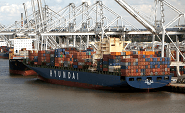Analysis

February 13, 2025
Great Lakes iron ore trade tumbles in January
Written by Brett Linton
Iron ore shipments on the Great Lakes saw a sharp decline in January 2025, according to the Lake Carriers’ Association (LCA).
Total January ore shipments were down 28% year over year to 2.01 million short tons (st). Shipments were 13% lower than the five-year-January average of 2.31 million st.
Over one-third of January iron ore shipments came from the Two Harbors, Minn., port (36%); followed by Duluth, Minn., (23%); Superior, Wis., (15%); and Silver Bay, Minn., (11%).
Recall that in 2024, annual iron ore trade was 49.77 million st, 3% less than 2023, but 4% greater than the five-year average. Across the past five years, the highest annual rate was in 2019 at 53.46 million st, while the lowest was in 2020 at 41.23 million st.
LCA represents 13 member companies that operate 45 vessels on the Great Lakes. Supporting numerous American industries, these ships can transport more than 90 million st of cargo each year, ranging from iron ore, stone, coal, cement, grain, salt, and sand.






